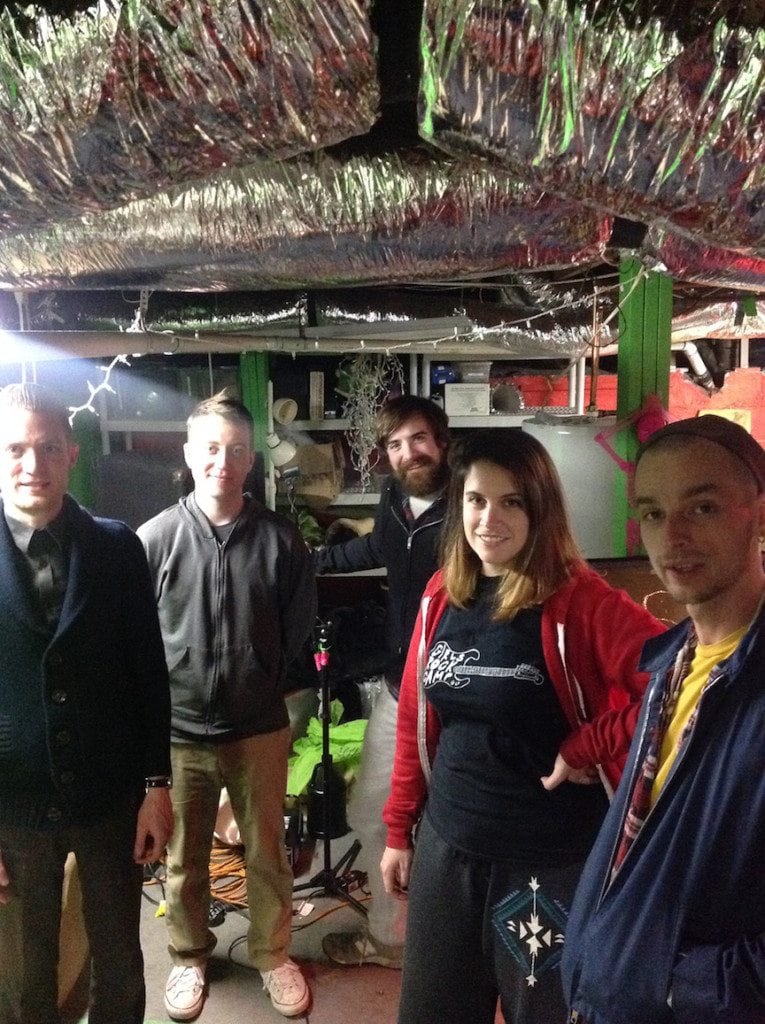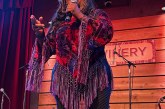“He just comes up with things and then assigns meaning to them later.”
Tim Eisinger is ribbing Alex Stevens, who has just explained–conceivably for the first time to the rest of his band-mates–that the meaning, or definition of the band’s name is “what you do after you’ve been on the toilet.”
The band’s name is Paperwork.
Armed with a catalog of seven new originals, the Marina Orchestra alums frenetically debuted their giddy new ska-inflected power-pop and indie rock in a short, tight, gleeful set for a curious and excited crowd at Pilot Light on Saturday, January 23, in their first show under the new moniker and their first time on stage since losing Marina front-man Justin Powers to the jazz queen ladies of New Orleans.
Stevens’ reductive deconstructionist leanings remain apparent in his assessment of the show over a meal at Senor Taco the following Monday. He says that before recorded practices or shows like the Pilot Light debut, he’s never really sure what he sounds like or what his style is, but, he says, “When I hear it from the other side of the microphone…it’s a pleasant surprise.”
The rest of the band seems to echo this breezy, do-it-then-decide-what-it-means philosophy. Eisinger says when the band gets into a practice, even with only the slightest beginning of a lick in someone’s mind, “it’s easy to expect to turn something over.”
Bassist Josh Duncan shares the acceptance of spontaneity and appreciation for writing together in the room and seeing what comes out, adding, “It would not have turned out the way it did otherwise.”
Rachel Gurley, alto sax, keys and harmony vocalist for the group, explains the dynamic vibe at a Paperwork practice: “Everybody just fills in at exactly the right time, and suddenly there’s a song…and we’ll magically all stop at the same time…and we just kind of stand there in awe.”
“We’re not afraid to totally deconstruct what we just did and start over,” drummer Brad Duncan (no actual relation to Josh) shares from the far end of the table. He seems like the wily, wild-eyed, furry-faced id of the group. “I just like to smash sh*t on Mondays,” he says. “It might as well be on a drum set.”
He also adds that there is “no ego,” in the band, which prompts the table to decide that all quotes in the article will henceforth be attributed to him. It didn’t turn out that way, journalistic ethics and all. Sorry Brad.
“We’ve stopped referring to it as ‘your’ song,” Stevens continues, and the rest of the group come to realize that many of their songs spend a long time with no name at all, just as ‘that surfy song in A Minor’ or something like that, and by the end of a session, they’ve all applied so many brushstrokes to a tune that it’s not claimable as anyone’s baby, other than the band’s as a whole.
Lyrically, the same nonchalant approach: “I very much tend towards the abstract,” Eisinger said of his lyrics. “I feel like the sound of words and their connotation to the listener is more important than a story or literal meaning.”
The group started writing as Paperwork in April and paused in August to prepare for and play a highly anticipated and ultimately wild Marina Orchestra reunion show, in which openers The Crumbsnatchers had the crowd so hyped they took it back to the ’90s with slam-dancing, skanking and, yes, even some good old-fashioned crowd-surfing across the 20 feet of horizontal space in the venue.
Surely the band must have felt the capital they’d built up in their original band had serious momentum to carry them into their new project.
“I think we all have a similar work ethic that’s residual from Marina,” Gurley attests. But that may be where similarities leave off.
As becomes apparent talking to this group, they may be the most democratic band in Knoxville, frequently agreeing with or deferring to each other in conversation and calling themselves “a collective.”
The sound is also refreshing and unexpected. The horns and the keys and the bouncy rhythm is still there, but structurally, vocally, and lyrically, the band takes on elements of punk, New Wave, and shoegaze indie. They readily compare themselves to Talking Heads, Violent Femmes and Modest Mouse. It’s clear that while Eisinger and Stevens may be primary lyricists and lead vocalists, the band writes together. Gurley is the glue. She fills in the sonic cracks with smooth, sugary-sweet harmonies and playful melodic runs on the keyboard and sax that often harmonize with Eisinger’s or Stevens’ guitar parts. Duncan holds it down on the bass in an energetic but understated way. He’s keeping the groove tight with no need for showy slapping or bass soloing. Same with the other rhythmic Duncan, Brad, on drums: he doesn’t show off. He has controlled power, but also a loose, comfortable flow into fills and transitions.
Perhaps not sonically, but in their makeup and approach, the guys and gals of Paperwork resemble another top-notch indie act of the past decade known for dual-vocals and great sounds all around: Dr. Dog.
A conversation arises about the merits of a person letting things come to them as opposed to chasing. Laughter and banter ensue about ladies chasing scared toddlers or puppies around a party when, if they’d just sit down and act casual, the creature would be in their lap in moments.
The band agrees that the same philosophy can extend to music, and that they feel the lack of pressure they put on themselves may make for better art.
“Nobody feels the need to treat this like a business,” says Eisinger.
“But,” Gurley adds, “we do hope people dance.”








